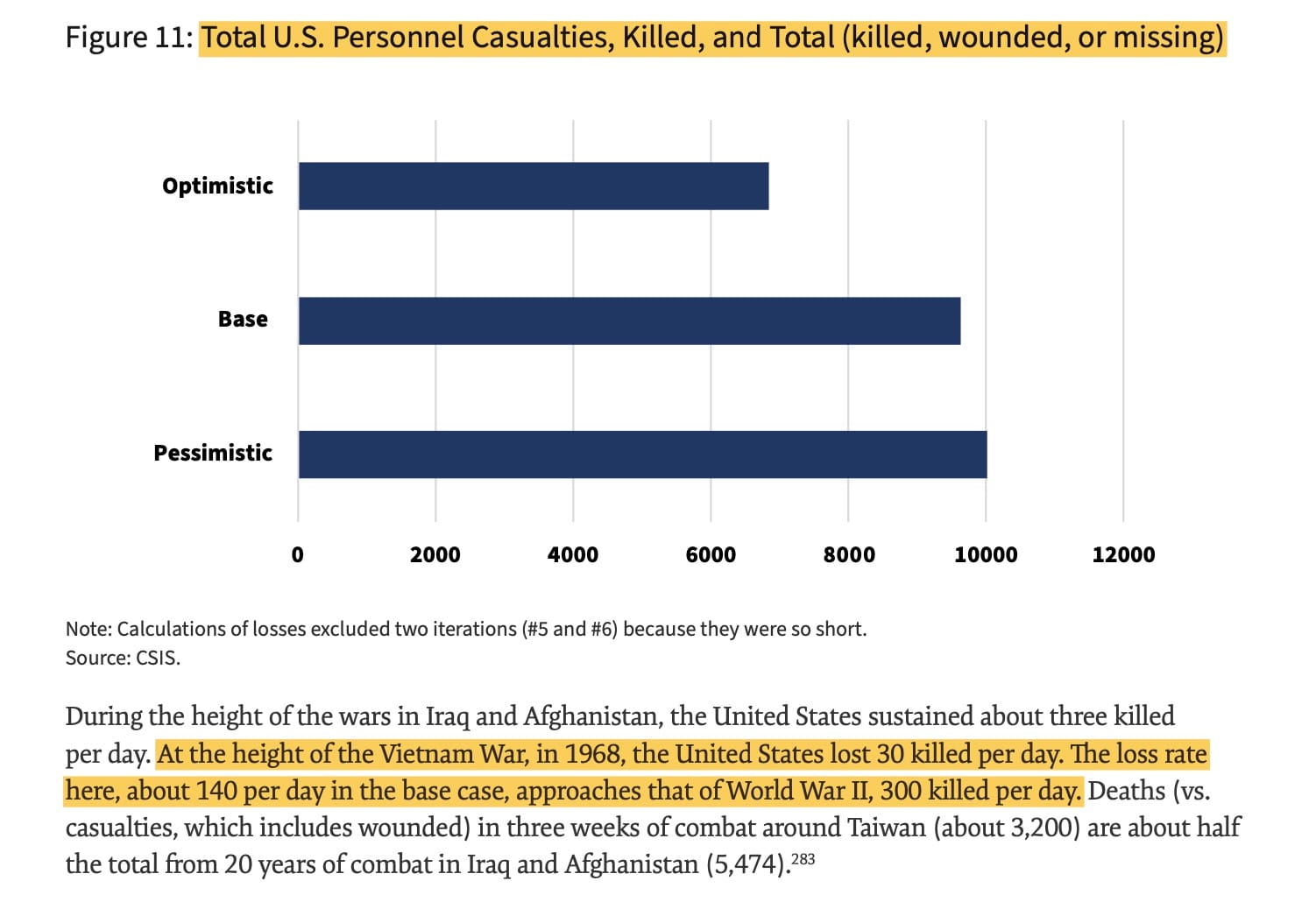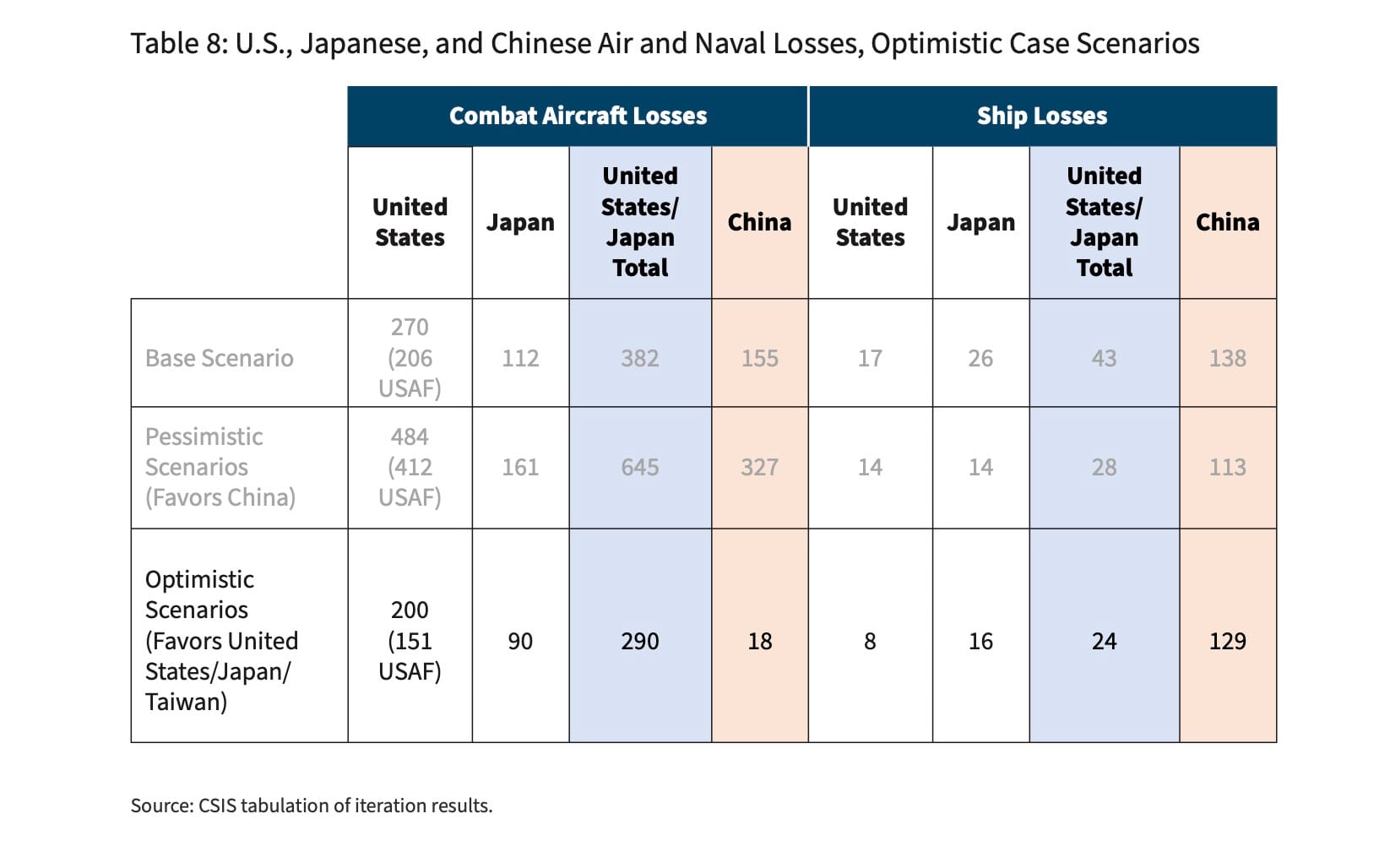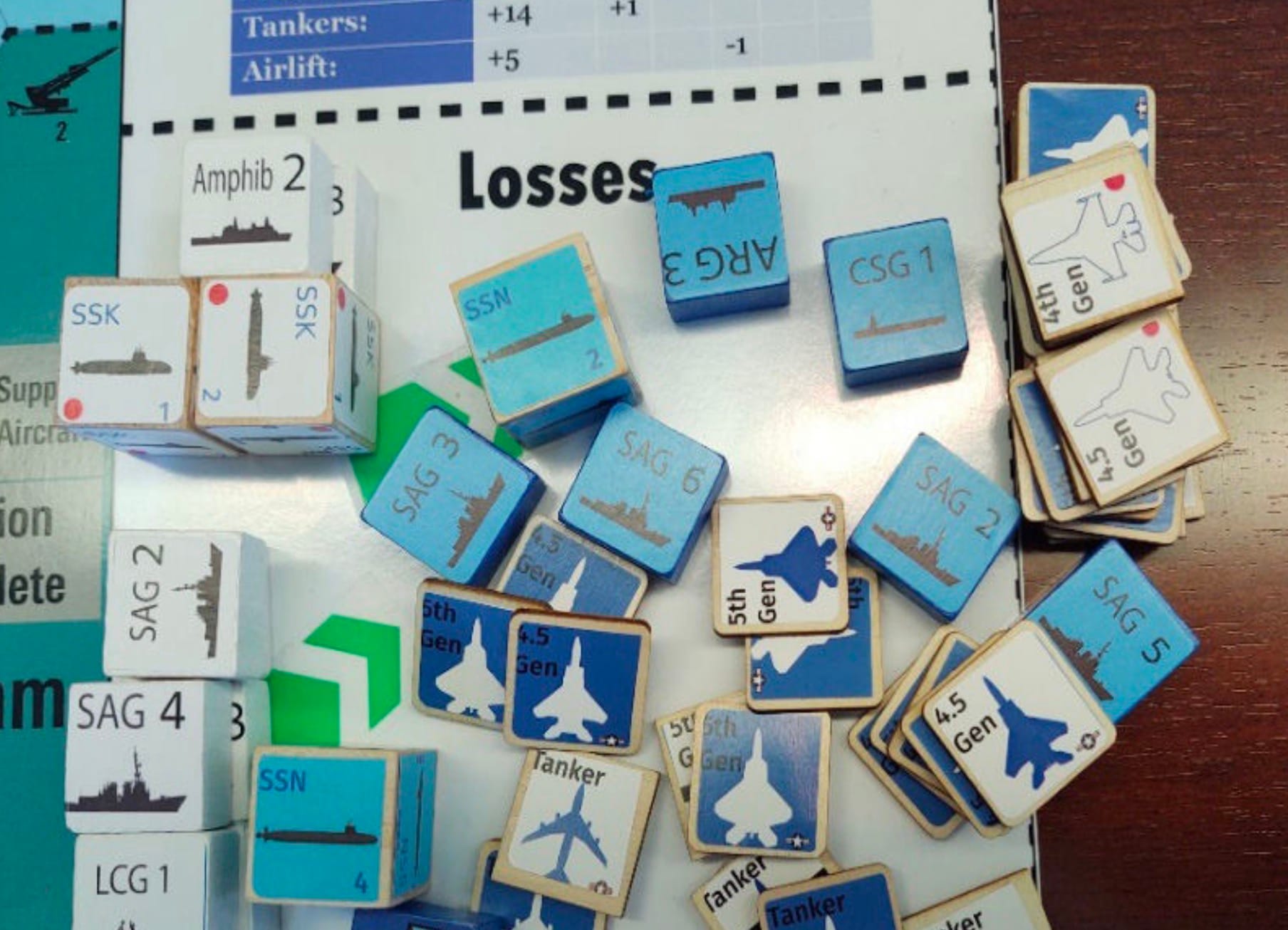Wargaming Taiwan

In most wargames against China, America “gets its ass handed to it” (RAND), is “unable to deter and defeat Chinese aggression” (DoD), and is “not just losing, but losing faster” (Air Force). In the one wargame they do ‘win’ (CSIS), Taiwan is left “a damaged economy on an island without electricity and basic services.” Meanwhile the United States takes up to 10,000 casualties, loses two aircraft carriers, 40% of its jets, and takes Japan down with it. This is the ‘winning’ scenario, forecast by people who just lost the Red Sea to Yemen. What are we even talking about here? Let's talk about it.
The Zeroth Assumption
The CSIS (Lockheed Martin, Northrop Grumman, etc) wargame exceeds its classified counterparts in transparency, we can actually read about it (file included at bottom). They disclose their (four) assumptions, as asinine as some of them are. What goes unsaid is the the zeroth assumption, that this would be a short war. On average, the wargame ends after 21 (real-world) days. Enough time to declare ‘Mission Accomplished’ and move on.
Meanwhile everyone that fights America—from the Viet Cong to the Taliban—knows that you can just wait them out, even with inferior forces. ‘You may have the watches, but we have the time,’ as the Afghans say. The CSIS mentions this in passing, saying “China could choose other coercive paths, whether it be the seizure of offshore Taiwanese islands, a bombardment without ensuing invasion, or a blockade,” and indeed, why wouldn't they? Why play the American's game at all?
I'd say the CSIS is wrong from zeroth assumptions (that China would do one repetitive, suicidal charge and give up within three weeks), but let's go through their other assumptions to make asses of you and me.
The Four Assumptions Of The Apocalypse
The four assumptions are 1) Taiwan loses immediately 2) America on its own loses quickly and that 3) Japan is necessary to prevent total defeat. Oh, and 4) magic missiles. To repeat, the assumptions are,
- Taiwanese dying in meat waves after their Air Force and Navy gets obliterated on day one.
- The US immediately engaging in direct combat with China
- Japan joining in, with immediate basing
- Untested US missiles working (land missiles becoming anti-shipping missiles)
Don't take my ribald word for it. The report says 1) “The invasion always starts the same way: an opening bombardment destroys most of Taiwan’s navy and air force in the first hours of hostilities,” and 2) “Without having to worry about U.S. forces in Japan, the PLA was able to focus its land-attack missiles on Guam, negating it as a base... Under withering fire the US fleet was largely destroyed without relieving Taiwan,” and 3) “the ability to operate from U.S. bases in Japan is so critical to U.S. success that it should be considered a sine qua non for intervention.” Then the final point, 4) “In games where the JASSM-ER has maritime strike capabilities, the abundance of U.S. munitions made U.S. strategy an almost uncomplicated exercise. However, as discussed in the assumptions chapter, the JASSM-ER might not have this capability.”
I repeat, but WTF are we talking about here? This is like saying I'll play a poker game where my little brother loses immediately, some random guy stakes me and him, and also I get all the jokers, which the pack may or may not contain. And the result isn't even winning, it's just the other guy losing. As the saying goes, assumptions make an ass out of you and me.
American Tolerance For Pain

This wargame just assumes that America wants to play, and totally elides over the stakes. We're talking about thousands of casualties and the decimation of US military power for decades. Remember that this is a US Navy that fled the Red Sea after losing a few F-18s, but we're expected to believe that they're OK with losing two aircraft carriers entirely.
As the report says, “In the most intense iterations, the U.S. Navy was losing a major ship every day of the war.” In full, they said, “U.S. losses of large surface ships typically totaled two carriers and 15 to 25 cruisers/destroyers. Although this represented only about 15 to 25 percent of total U.S. Navy surface combatants, losses typically included nearly all large surface ships in the Western Pacific.” The word ‘only’ is doing a lot of work here. America would double-decimate its own fleet.

The US Air Force would also be double or even triple-decimated. “The United States and Japan lose hundreds of aircraft in every iteration, from an average of 290 in optimistic cases to 646 in pessimistic cases. For the U.S. Air Force, this represents 12 to 32 percent of its operational fighter/attack strength after three to four weeks of conflict. The picture below shows U.S., Taiwanese, and Japanese losses (over 900) from one game iteration (#13), a pessimistic and intense encounter that ended in stalemate. The losses represent about 40 percent of the Air Force’s fighter/attack operational inventory. This would degrade U.S. power for decades.”

Then there's dead and wounded debt slaves, of which America would suffer 7,000 in the optimistic scenario, a third of them KIA. American soldiers would be dying at a rate 3x higher than Vietnam, which led to them never being able to conscript again. As the report says, “During the height of the wars in Iraq and Afghanistan, the United States sustained about three killed per day. At the height of the Vietnam War, in 1968, the United States lost 30 killed per day. The loss rate here, about 140 per day in the base case, approaches that of World War II, 300 killed per day.
The report excludes political considerations, but war is just politics by other means, and it's hard to imagine Americans (who don't matter) being OK with those, nor the stock market (which does). In every recent war, America has been bombing poor countries using poor volunteers, it had no impact on their home front. War with China, however, would crash their politics and, more importantly, their markets. If you thought tariffs with China was bad, war with China would be terrifying. Goods would stop coming in and only body bags would come back. It's hard to see America steeling this out for more than a few days, let alone weeks.
The Japanese Squeeze
America also cannot win this wargame alone. In every iteration, Japanese support is required, at the minimum letting America use its occupation bases for aggression, and at the maximum using civilian Japanese civilian airstrips! The plan, any plan, simply does not work without Japan. Even the best laid plans, however, ends up with Japan getting bombed, most of their fleet sinking, and much of their planes being destroyed on the ground. So quite a big gamble to ask Japan to take based on… vibes.
Japan has no offensive agreement with America, and no agreement with Taiwan at all. “As Japan analyst Jeffrey Hornung observes, none of the critical decisions about Japanese assistance to U.S. operations are "legally automatic... All these decisions are political."” This is not to say that nuked and neutered Japan won't follow along, but they have to follow instantly for the plan to work, and they can deny victory by merely demurring. And without basing in Japan, those bases getting hit by China, and then Japan being drawn into war, every ‘winning’ scenario falls apart.
Meanwhile if the plan does work, Japan would have just unplanned its economy and disarmed itself. The cost of joining America would be that “Japan also suffered heavily: two out of the three base iterations saw strikes against airfields across the length of the archipelago... Japanese air losses were also high in two out of three iterations, averaging 122 aircraft, and... The JMSDF [Navy] suffered even more heavily, as all its assets fall within the range of Chinese anti-ship missile systems.” America is asking and assuming a lot of Japan here. As the CSIS wryly states, “One caution in assessing these results is that these Japanese actions reflect the preferences of U.S. players.”
Unknown Unknowns
Then there are the pieces kept off the board, like drones and electronic warfare. In a classified Joint Chiefs wargame, “the blue team lost access to its networks almost immediately,” but CSIS comments that it's “unclear was what sort of cyberattack caused this loss of capability or what the China team did to “run circles” around the U.S. team.” So they just don't account for EW at all. In the same way drones and drone warfare are just not mentioned, there's just a small paragraph called “New Domains Are Important but not Decisive.”
The report was admittedly written in 2023, but it's a strange decision in 2025, when we've seen how decisive drones and electronic warfare are. China is the world's drone leader and has a newer, technologically superior military to America's, which is last century's stock. America won't even know what hit them. They haven't wargamed for any of the new game changers of war.
Wargames With Other People's Lives
America, of course, has no business in China's internal business at all (how both China and Taiwan see this). The Kissinger hypothetical “It's dangerous to be America's enemy, but fatal to be America's friend,” has been proven many times over since then, with Ukraine most recently. War, however, is America's business, and their innovation is finding out that there's more money losing wars, looting your own treasury, and dumping the costs on your ‘allies’. And this is precisely the context that they're playing with Taiwan.
Hence the ‘winning’ scenario is bad except for everyone except CSIS's paymasters, arms dealers like Lockheed Martin and assorted ghouls like Bill Gates, etc. The whole thing is really sponsored content for merchants of death. Taiwan gets destroyed, Japan gets destroyed, and America gets decimated, but who cares, weapons stocks will go up. This is really like the judgement of Solomon, where he offers to cut a baby in half, and America is the bad mother (fucker) that accepts such a state as ‘winning’ at all.